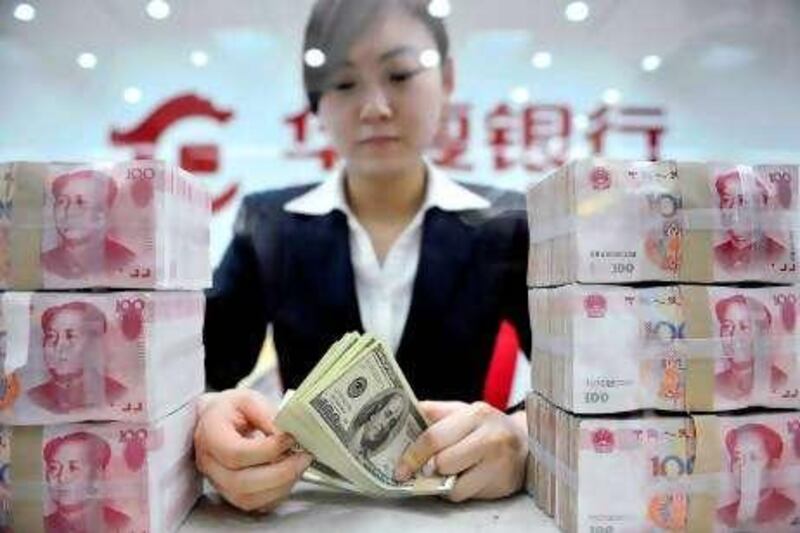BEIJING // Economic and political pressure has fuelled a nine-day rise of the yuan against the dollar, with analysts predicting the Chinese currency will continue to climb this year. The yuan yesterday breached the 6.7 mark against the dollar, putting it at its highest since 1993, after continued criticism from the US over what it sees as an undervalued currency.
The reference rate at which the People's Bank of China, the central bank, allows the yuan to trade was yesterday set at 6.6997. This was the first time the rate had been set below 6.7 since the central bank began managing the yuan against a basket of currencies in July 2005. The currency can trade 0.5 per cent either side of the rate. Last week Timothy Geithner, the secretary of the US Treasury, said the value of the yuan had remained "essentially unchanged" since a pledge in June by the Chinese authorities to let it float more freely.
Mr Geithner said the US would use all methods it could to try to raise the value of China's currency. His comments, which followed similar remarks this month, were met with a robust response from Beijing. Li Daokui, an adviser to the central bank, insisted China "will not appreciate the yuan solely because of external pressure". But that pressure on the world's most populous nation continued on Monday when Barack Obama, the US president, said the yuan was "valued lower than market conditions would say it should be".
Mr Obama said "there should be an adjustment based on market conditions" because of China's increasing wealth and booming economy. "They have said 'yes' in theory but in fact they have not done everything that needs to be done," he said. The US believes its manufacturers are suffering because markets are being flooded with artificially cheap Chinese products due to the exchange rate. China has had trade surpluses of close to or more than US$20 billion (Dh73.46bn) for the past four months, peaking at $28.7bn in July.
Isaac Meng, a currency analyst with BNP Paribas in Beijing, said it was not just US pressure that had triggered the nine-day rise. "[The appreciation] is not surprising considering the overall global dollar weakness triggered by the expectation of quantitative easing in the US," Mr Meng said, referring to the possibility of the US Federal Reserve increasing its reserves. "The dollar index in the last month dropped by 4 per cent, which more or less corresponds to the 1.5 per cent [yuan] appreciation.
"Domestically, we have rising inflation pressure, which means a rising [yuan] will help." But Ren Xianfang, a Beijing-based analyst at the economic research and forecast organisation IHS Global Insight, said the recent appreciation of the yuan "to a large extent reflects political pressure from the US side". The increase in the strength of the yuan had been made by the central bank "in order to lead off criticism from the US side", Ms Ren said.
"It's related to the overall political environment that China is facing from the US side," she said, while adding wider economic conditions related to the weakening of the dollar were also a factor. Ms Ren said there was likely to be limited further appreciation of the yuan against the dollar, about 2 per cent overall this year - an amount that would be "politically and economically acceptable to China".
Mr Meng said a 3 per cent appreciation over the year was possible. Mr Obama is set to meet the Chinese premier, Wen Jiabao, tomorrow at the UN General Assembly. US politicians are considering legislation to target Beijing over what some see as currency manipulation. But senior officials have questioned whether this would breach World Trade Organisation rules and there have been warnings from officials in previous administrations that action could backfire on the US.
business@thenational.ae






